
Track These 12 Affiliate Marketing KPIs (+ 3 Metrics to Avoid)
Tracking affiliate marketing KPIs lets you make informed decisions to optimise and grow your program. Find out which KPIs to track and which ones to avoid.
Track These 12 Affiliate Marketing KPIs (+ 3 Metrics to Avoid)
Affiliate marketing KPIs inform you about the impact of your affiliate program on your business and marketing goals. They help you predict trends, evaluate your campaign’s effectiveness, and optimise your affiliate marketing strategy. They’re also the most important metrics to track and pay attention to.
But what makes an affiliate marketing KPI and what’s best left at the metric level?
The former is directly linked to your brand’s strategic goal. It’s also used to measure your program’s performance against your objectives. Meanwhile, metrics are used to measure the performance of specific processes. They tend to have a broader scope and may not always align with your specific business objectives.
Let’s dive into the 12 KPIs you should consider tracking and the 3 metrics that you should avoid focusing on.
12 Affiliate Marketing KPIs and How to Track Them
You grapple with different types of data daily, but not every single one can give you the insights you need. How will you know which ones you can use to help you grow your affiliate program?
In this section, we’ll focus on three main types of KPIs for affiliate marketing: benchmarking KPIs, KPIs for individual affiliates, and KPIs to gauge affiliate marketing performance. Under each KPI, you’ll find an easy-to-follow guide on how to track it using either Google Analytics or Trackdesk.
Benchmarking KPIs
Tracking benchmarking KPIs allows you to measure and assess your affiliate marketing performance against that of industry standards or your competitors. Doing so also lets you gain insights into areas for improvement and best practices, as well as set realistic targets for affiliate program tracking.
The KPIs listed below will help you identify top affiliates and determine how you can optimise affiliate marketing performance against industry standards or competitors.
1. Sales per affiliate
Sales per affiliate refers to the number of customers that each affiliate brings. Tracking this KPI allows you to achieve several things:
- Identify affiliates that bring the highest sales value to your business
- Benchmark sales that each affiliate generates, which you can use to set new targets and incentives for top performers
- Determine which new affiliates have the highest potential to bring greater value
- Monitor affiliate performance so you can offer the necessary resources to facilitate growth
How to track:
There are several ways to track sales per affiliate, depending on your business model and goals. Note that each method has its own set of advantages and drawbacks. To learn more about which affiliate tracking method best fits your business, check out our in-depth affiliate tracking guide.
Trackdesk lets you track postbacks, which are URLs that transfer conversion information. Also referred to as “cookieless tracking” or “server-based pixels,” postbacks allow affiliate marketers to conveniently track and attribute conversions. Plus, with postbacks, there’s no need to use cookies. This means you can quickly attribute conversions.
To track postbacks using Trackdesk, open the Trackdesk UI and navigate the menu on the left side of the screen. Click the “Tracking” option and select “Postbacks.”
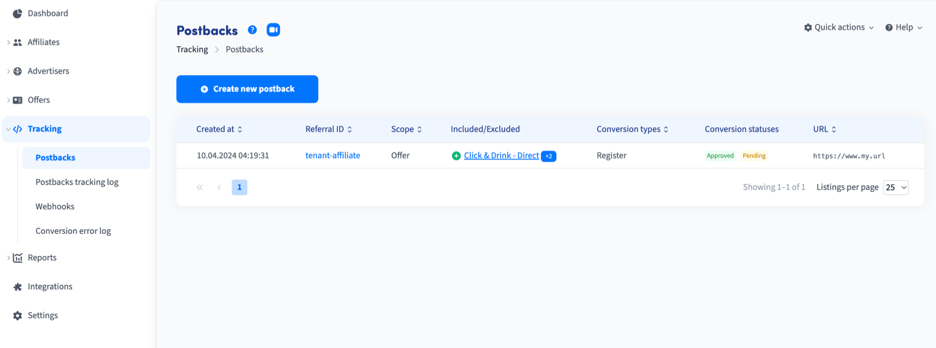
Clicking on the “Postbacks tracking log” will let you review critical information, such as when the postback was created, its conversion status, and conversion type.
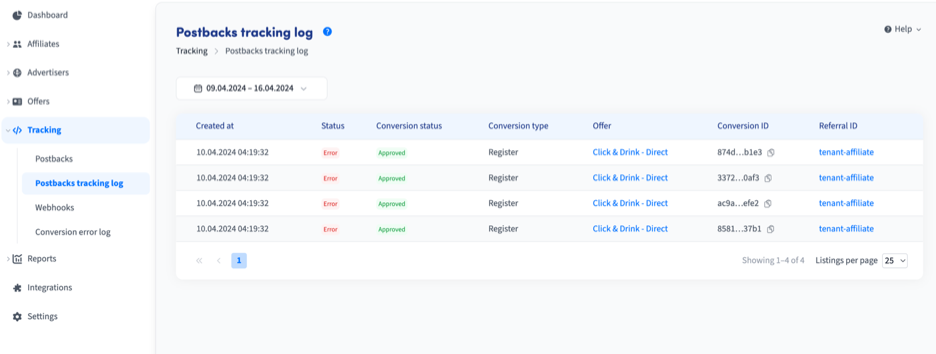
2. Year-over-year growth
Tracking this KPI gives you insight into your affiliates’ and program’s growth trajectory. It lets you see which affiliates are improving and which ones are stagnating over a period of several years. By giving you a longer timeframe, you get to see the trend in your sales performance over the years instead of basing your data on fluctuating monthly results.
It also gives you critical insight into aspects like product demand and affiliate growth rate. Furthermore, by tracking this affiliate marketing KPI, you can:
- Identify trends and patterns
- Determine which strategies are successful
- Make informed business decisions for future endeavours
How to track:
Trackdesk gives you an overview of affiliate performance, which you can use to monitor aspects like clicks and conversions. Open the Dashboard tab to get a comprehensive overview of your affiliate marketing performance. Click the new window icon on the Performance section. This will redirect you to the Daily overview page. Change the default 30-day window to a YoY comparison to review annual data. Click the calendar icon as shown in the photo below and select “Last year.” Click “Apply” to implement changes.
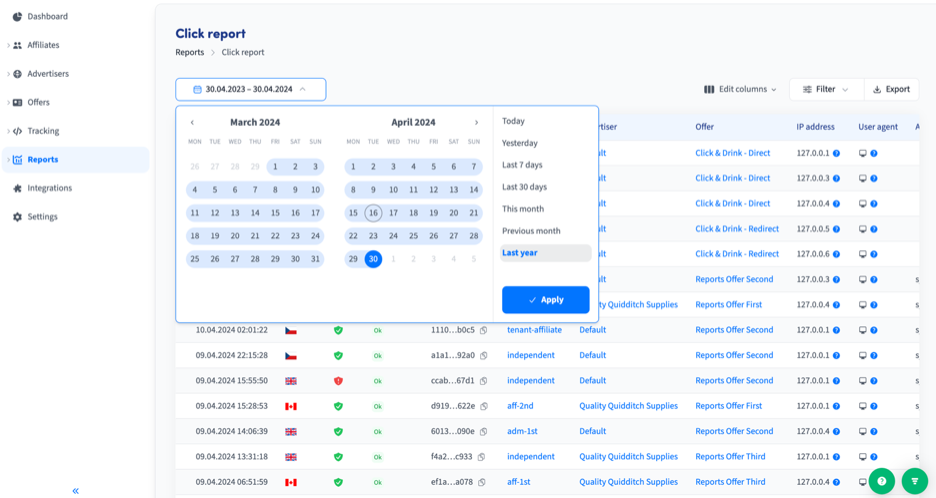
3. Percentage of affiliate sales vs. overall sales
Tracking this KPI allows you to determine whether or not your affiliate program is profitable. This also lets you see where the bulk of your revenue is coming from—if it’s from direct sales or your affiliates.
To get the best of this KPI, you should operate with both gross and net sales.
The former refers to the total number of sales generated by affiliate marketing campaigns. The latter refers to your total gross sales excluding cancellations or returns.
Doing so allows you to identify product issues to mitigate return rates, detect fraudulent activity, and identify areas for improvement in aspects like logistics. When monitoring gross sales versus net sales, if the former is higher than the latter, this might point to a pressing problem.
How to track:
Trackdesk offers convenient affiliate tracking, allowing you to create a more effective and robust affiliate marketing program. Use it to uncover traffic sources, optimise offers, identify top-performing channels, and customise sales tracking.
To track the percentage of affiliate sales, open your Trackdesk account and click on “Reports.” Select “Affiliate overview.” This lets you view data, such as revenue per click (RPC) and earnings per click (EPC).
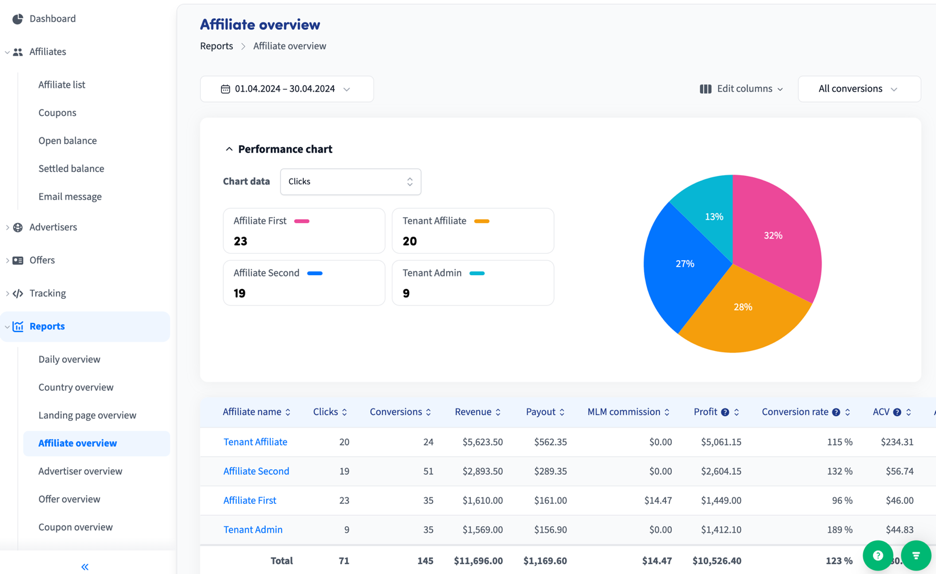
KPIs for Affiliates
Measuring these affiliate marketing KPIs allows you to assess affiliate performance. Through these, you can better identify high-performing affiliates and create competitive and more beneficial offers.
1. Conversion rate
Clicks are great, but if they don’t translate to conversions, they’re not going to benefit your business in the long run. Conversion rate refers to the percentage of visitors (clicks) who convert into customers.
To calculate your conversion rate, use this formula:
(Total number of conversions/Total number of visitors) x 100
Getting high conversion rates shows that your affiliates are effective at reaching your target audience. Tracking this KPI also helps you optimise your program by:
- Allowing you to evaluate the performance of your affiliate marketing campaigns
- Helping you set expectations to scale your affiliate marketing performance
- Identifying high-value customers to provide them with personalised campaigns
How to track:
Use Trackdesk to track your conversion rate and set up different conversion types based on your program goals. Click “Reports” and select “Affiliate overview.” Choose the chart data you want to review. In this case, select “Conversions” and indicate the specific period you want to review by clicking the calendar icon.
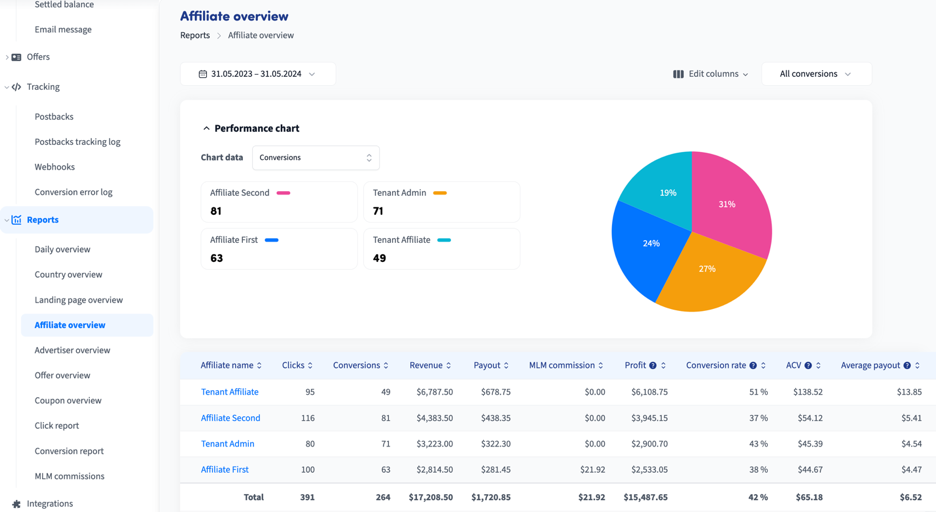
2. Revenue per click (RPC)
This KPI shows the average revenue that each click on your affiliate link generates. Measuring this lets you assess the quality of your affiliates’ offers and how these impact your overall revenue generation efforts. Aside from RPC, earnings per click will help you assess your campaign’s performance and profitability.
Tracking your earnings per click (EPC) shows you the monetary value generated by each click on your affiliate link. This lets you assess the profitability of aspects like your affiliate marketing campaigns, products, and affiliates.
How to track:
Trackdesk lets you monitor both your RPC and your earnings per click (EPC). Open your Trackdesk dashboard. Click “Reports” and select “Affiliate overview.”


3. Clicks
They’re often the first touchpoint in any buyer’s journey and can help indicate potential conversions.
Note that when it comes to clicks, make sure to focus on tracking those that are targeted or qualified. Also, focus on clicks that become conversions, as not every click corresponds to a purchase. Otherwise, blindly tracking this KPI can be potentially misleading. Lastly, don’t just base your program’s performance and progress based on clicks. You need to factor in other KPIs for affiliate marketing like sign-ups.
How to track:
To view the clicks each affiliate generates, go to “Reports” and select “Affiliate overview.” You can also select “Click report” under Reports for a more detailed look.

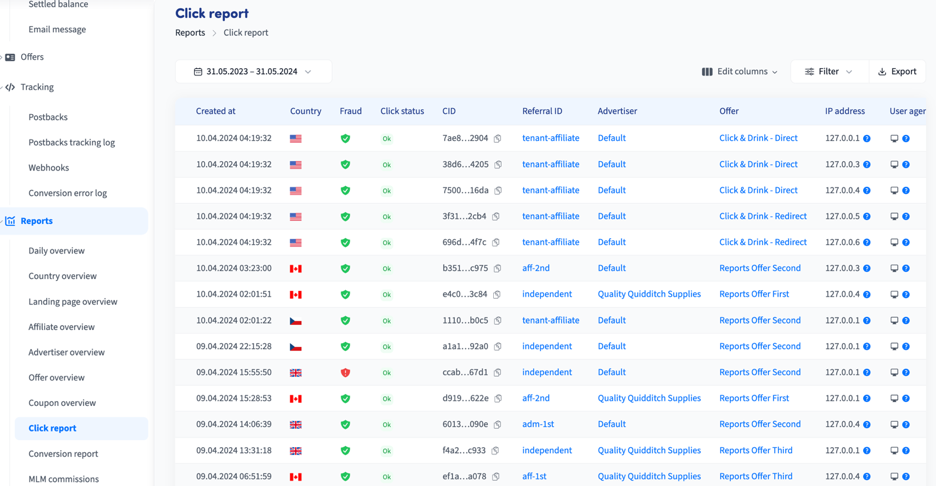
4. Customer lifetime value (CLV)
CLV indicates the projected total value that a customer brings. Monitoring this also shows you the potential customer acquisition cost and lets you assess how affiliates can potentially succeed in acquiring loyal customers over time. Lastly, by tracking this KPI, you’re in a much better position to craft marketing strategies that will allow you to attract high-value customers and incentivise top-performing affiliates. By leveraging customer data management, you can gain deeper insights into customer behavior and preferences. Plus, KYC remediation improves the accuracy of customer data, enabling better targeting of high-value customers.
How to track:
Calculating your CLV means taking into account all the costs incurred to acquire a customer. This includes costs incurred by your affiliate marketing program.
Use this formula to get your CLV:
Average order value x Purchase frequency x customer lifespan
To calculate your AOV and purchase frequency (PF), use these formulas:
Total revenue/Total orders = AOV
Total unique customers/Total orders = PF
Affiliate Marketing Performance
These affiliate marketing performance KPIs will help you measure the effectiveness of your campaigns.
1. Revenue
Revenue is one of the most crucial affiliate marketing KPIs to track for affiliate marketing performance. You need to assess every other KPI within the context of your affiliate-driven revenue to see how each one affects it and to gauge the overall performance of your campaigns. By monitoring affiliate-driven revenue, you can also identify who your top-performing affiliates are, how much you can allocate to incentivise affiliates, and what your revenue growth trends are.
Revenue lets you see the bigger picture, particularly when it comes to how your affiliate marketing program influences your brand’s growth. Affiliate managers make decisions based on affiliate performance and by analysing other KPIs like conversion rates, not just revenue.
How to track:
You can easily get an overview of your revenue via the Trackdesk dashboard, which also shows you an overview of your best-performing affiliates and the latest conversions.

Your Trackdesk Conversion Report also gives you a more detailed look at every single conversion, including its conversion status and revenue.
2. Reversed sales rate
This KPI shows you the number of refunded purchases. Knowing the reversed sales rate gives you insight into aspects like product quality and affiliate credibility. Also, when a reversal happens, you may need to refund commissions. This, in turn, can affect your profit margins and your affiliates’ morale.
How to track:
Tracking this can be tricky, which is why it’s best to use an affiliate tracking platform that offers a built-in system for refund handling. Trackdesk offers both cancellation and refund protection, as well as automated refund handling.
If you run a Shopify store, you can use Zapier to automatically handle refunds.
3. Percentage of fraudulent orders
Fraudulent orders can take a toll on your business. Globally, losses due to fraud are expected to reach $343 billion between 2023 and 2027. Furthermore, eCommerce companies lose approximately $48 billion annually due to fraud.
This is why businesses must be proactive in monitoring their affiliate campaigns to mitigate fraudulent orders. You can do this by monitoring your chargeback rate.
How to track:
Use this formula to get your chargeback rate:
Gross affiliate sales/Net affiliate sales
If you get a high chargeback rate, you may be experiencing fraudulent activity. Having such rates may also affect your reputation with payment processors, which may result in them charging higher fees to cover fraud risks.
Note that chargeback rates will vary depending on factors like your industry, customer purchase behaviour, and fraud susceptibility. For instance, average chargeback rates in retail and the health and wellness industries are at 0.52% and 0.86%, respectively. For eCommerce, the average runs between 0.5% and 0.9% of your total sales.
4. Percentage of active affiliates
Just because you have a lot of affiliates doesn’t automatically mean that they’re all effective at driving leads and sales. Also, if you see this percentage drop, this doesn’t mean that your program is unsuccessful—so hold off on removing inactive affiliates. These are affiliates you’ve previously worked with but have stopped actively promoting your brand.
Some affiliates may simply have a hard time driving conversions and may need more support. If you need to re-engage inactive affiliates, check out these strategies for motivating your affiliates.
Knowing your percentage of active affiliates lets you determine how you can best boost your sales. It also gives you an overview of your affiliate program’s performance and shows you which active affiliate members are driving conversions so you can reward them accordingly.
How to track:
To track your program’s percentage of active affiliates, open your Trackdesk account and select “Affiliates” from the menu. Then, click “Affiliate list.” This will show you the status of each affiliate.
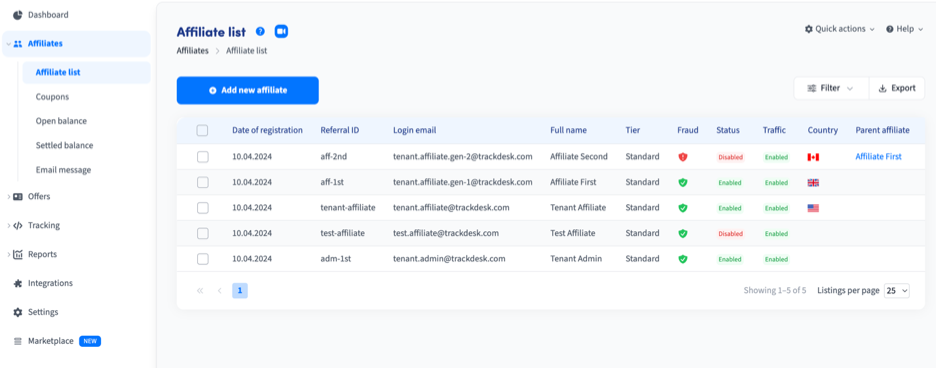
5. Cost per affiliate sale/cost per lead
This KPI shows how much you’re spending on affiliate sales or leads via your affiliate channels. Tracking your CPA/CPL tells you how much money you need to spend to close a sale. It also helps determine if your program is cost-effective or not by comparing your figures with other marketing platforms.
CPA alone doesn’t tell you much. Instead, measure it alongside your affiliate payback time, or how many weeks or months it takes to break even. This tells you how long it can potentially take to recover your initial investment. More importantly, affiliate payback time shows you if the investment is worth it.
Another way to determine your program’s profitability is by looking at your LTV:CAC ratio and using that as a KPI. This ratio helps you determine whether or not a customer’s lifetime value is higher or lower compared to the costs needed to acquire them.
How to track:
To get your CPA, tally up all the costs tied to your affiliate program. These include commissions and platform expenses. Divide the total cost by the total revenue generated by your program. Note that you need to consider all costs and revenue generated within the same period.
To calculate your payback time, use this formula:
Cost of investment/Average annual cash flow
A shorter payback time indicates that your affiliate program, including investments like CPA, is desirable.
To measure your LTV:CAC ratio, use this formula:
(Customer LTV)/(Customer CAC)
Getting a higher ratio (5 and up) indicates that there’s more opportunity for you to invest in bolstering your sales and marketing efforts. A lower ratio, such as less than 1, shows that you’re losing revenue on each customer.
Affiliate Marketing Metrics to Avoid Using as a KPI
Not all affiliate marketing metrics are worthy of the KPI status.
We’re talking about vanity metrics, such as impressions and total visits, and misleading affiliate marketing metrics.
While vanity metrics look great on the surface, they measure aspects that offer little to no impact on your affiliate program. They’re also not reliable indicators of growth and may not be particularly useful if you’re looking to make data-driven business decisions.
This section focuses on the four affiliate marketing metrics to avoid and why you shouldn’t focus your resources on tracking them.
Impressions
This metric shows the number of times your ads are shown to an audience. When an ad appears on one of your pages, that’s equivalent to one impression. You can’t easily tell where the impressions are coming from, so while it’s good that your brand is gaining traction, you don’t know the percentage of impressions that are relevant to your target audience.
Initial ROI
This can be a potentially misleading metric that may be influenced by factors, such as customers getting used to a new program or campaign. Launching a successful affiliate program takes time and it’s not like PPC where you could immediately see ROI.
Traffic Engagement Metrics
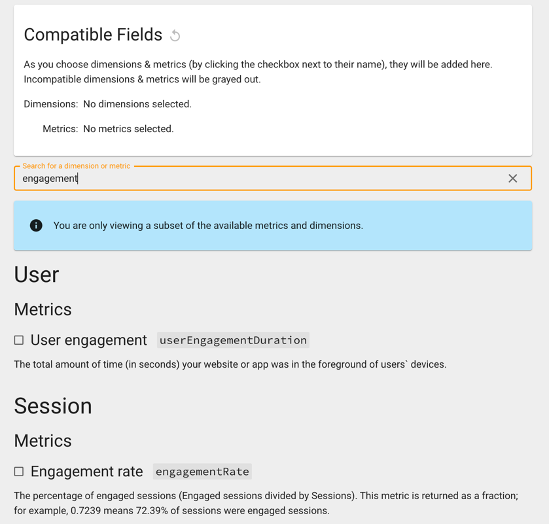
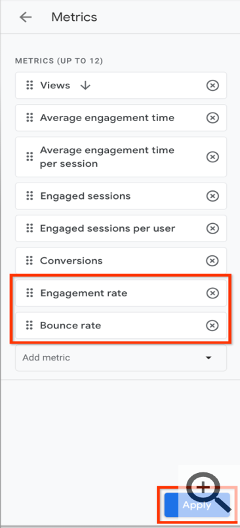
https://ga-dev-tools.google/ga4/dimensions-metrics-explorer/ and https://support.google.com/analytics/answer/12195621?hl=en
Traffic engagement metrics, such as time on page, page views, bounce rate, and average session duration, may be misleading for several reasons. They may be influenced by user behaviour, such as users who leave your site too fast or use ad blockers. These also rely on heavy segmentation before you can extract useful insights on affiliate marketing performance.
Next Steps
Choosing which affiliate marketing KPIs to track can seem overwhelming, especially if you’re just starting out. To help ease your journey, here are some recommendations worth looking into:
- Start small. You’re bound to encounter a lot of data. The best way to go about this is to start by identifying your business goals and objectives. Then, select one to two KPIs per category that align with your goals and objectives.
- Choose KPIs that you can easily measure over time. Also, go for tangible and relevant KPIs. These help you identify any issues or bottlenecks and then give you the necessary insights needed so you can address them.
- Don’t get lost in all the data. It’s pretty easy to be obsessed with data. However, you need to realise that you’ll still be able to find the best KPIs for your brand over time.
- Use the right affiliate tracking software. Find a reliable affiliate marketing software that fits your organisation’s needs and budget. Make sure that it integrates with your current tech stack, is customisable, and offers real-time and robust reporting. When picking an affiliate tracking software, check to see if it’s scalable and if it offers ample support for end users.
Ready to take your affiliate marketing performance to greater heights? Use Trackdesk to stay on top of critical affiliate marketing KPIs. Discover what you can do with Trackdesk today.

I have a passion for storytelling. I believe that a good story delivers value while capturing, influencing, and sustaining its intended audience. This has always been, and always will be, my primary aim as a writer.


